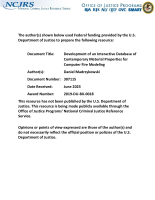Peer reviews
The sexual assault microbiome: Detecting contact when minimal male DNA is present.
Recovery and Analysis of Less Volatile Components for the Identification of Ignitable Liquid Residues in Fire Debris - Continuation of current NIJ-funded project (2020-DQ-BX-0003)
A Randomized Controlled Trial of the HeartMath Resilience Program: Exploring the Impact of Stress on Jail Staff Performance and Retention
Time Since Deposition for Touch DNA Evidence
Caring Connections for Youth: Evaluation of a Countywide Pre-Arrest Diversion Initiative to Reduce Racial/Ethnic Disparities
We Met Them Where They Are, But Is It Enough? A Qualitative Examination Of A Co-Response Outreach Program Servicing Vulnerable Populations in Philadelphia
Development of computational methods for genetic identification and kinship analysis of forensic samples
Next Generation Emergency Networks
Evaluation of cell capture and collection from bone
De-escalation Training: What Works, Implementation Lessons, and Taking It to Scale; Plenary at the 2023 NIJ Research Conference
Police use of force, while infrequently used, is a tremendous concern to public safety in the United States when officers employ it excessively or inappropriately, causing injury or death and eroding public trust in law enforcement. This plenary from the 2023 NIJ Research Conference describes the Integrating, Communications, Assessment, and Tactics (ICAT) de-escalation training program developed by the Police Executive Research Forum to guide officers in defusing critical incidents.
See the YouTube Terms of Service and Google Privacy Policy
Metabolic and toxicological considerations of the opioid replacement therapy and analgesic drugs: methadone and buprenorphine
Combating Elder Mistreatment Still Muddling-Not Yet Transformed
Development of an Interactive Database of Contemporary Material Properties for Computer Fire Modeling
The Viability of Virtual Peer Review and Microscopic Verification versus Traditional On-site Review
Measuring the Impact of Victim Services
Less lethal weapons: a technologist's perspective
Campus Sexual Assault Responses (CSAR): Informing Trauma-Informed Policies, Protocols, and Training
Sexual violence is a significant criminal justice problem with long-term effects for its victims. In particular, sexual assault on or related to college campuses across the United States presents a growing public health and economic burden, starting with significant impacts on academic outcomes.
See the YouTube Terms of Service and Google Privacy Policy




